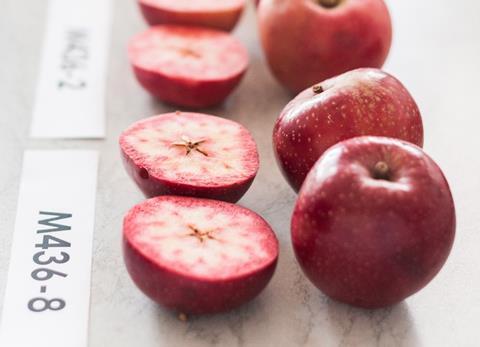
A new range of apples with red and pink flesh appears set to arrive on supermarket shelves across Europe and beyond after a group of growers and marketers agreed to produce and sell the fruit under licence.
Efforts to bring the apples to market took a significant step forward last month, when an evaluation panel consisting of 17 different companies known to be interested in the apples met in Edingen-Neckarhausen, Germany, to assess their progress.
Hosted by the range’s owners, South African plant breeder Re:inc Innovation and UK-based fruit science centre East Malling Research (EMR), the panel sampled various apple types from experimental orchards in Germany and Belgium before recommending the immediate commercial release of three new varieties and suggesting one further variety for potential future development.
“The delegates tasted ten selections – two red-fleshed and eight pink-fleshed apples – and the consensus was that three or perhaps four selections are commercial varieties in terms of their appearance and taste,” says one of Re:inc’s directors, Liezel Kriegler.
Re:inc and EMR have been working together on the breeding programme since 2008. Re:inc topfruit breeder Dr Iwan Labuschagne, who put together the range from varieties bred at EMR, describes the red-fleshed selections as crunchy, juicy and sweeter than any of the current crop of competitors. The pink-flesh selections, meanwhile, are “snappy (like a Honeycrisp) with lots of wonderful juice and aromas,” he says.
Clubbing together
In the meantime, Re:inc has assembled a club of international growers alongside a handful of selected marketers who will be granted exclusive access to its apple and pear breeding programme. “These licensees will have the exclusive rights to the new varieties in their countries,” explains Riaan van Wyk, also a director at the company. “Crucially, this will also ensure supply of the varieties for 12 months of the year.”
New types of fruit emerging from the programme are going to deliver new tastes and flavours for consumers to enjoy, Van Wyk adds. In particular, he points to very sweet, fully coloured pink apples as well as blushed, fully coloured and brilliant pink and red pears that offer a crisp, juicy eating quality. “The consumers can eat these pears from the tree or fridge like an apple, but with a lot more aromas and flavour [than] ever previously experienced.”
Working with EMR, Re:inc’s plan is to roll out a comprehensive breeding programme that taps into international expertise, working with other breeders and variety owners to run production trials in both the Northern and Southern Hemispheres. “We have sourced a range of unique breeding parents from international breeding programmes since 2008 which we are evaluating and using in our new variety development programme,” Dr Labuschagne adds.
Kriegler says there is a lot of work that must now be done to expand the whole operation. “It is also important to find the correct international and South African partners and licensees for commercial plantings, increase the size of the breeding operation in the Northern Hemisphere to 5,000 to 8,000 seedlings per annum – in order to be at the same level as the South African operations – and to introduce modern technology, like marker-assisted selection (non-GMO) where applicable.”






No comments yet